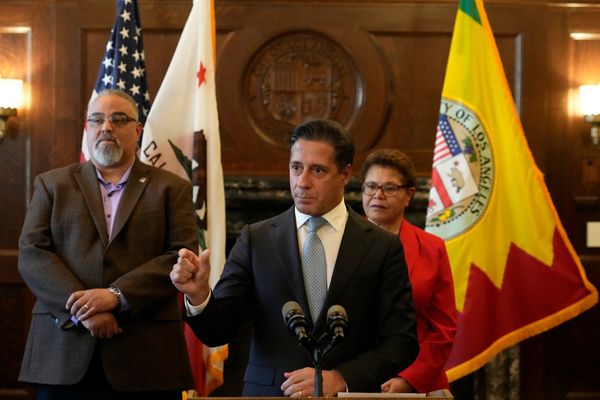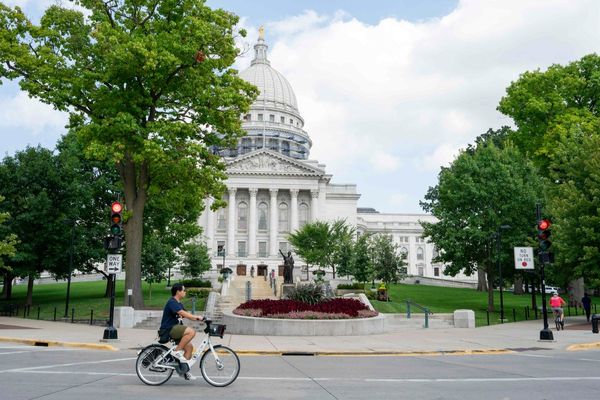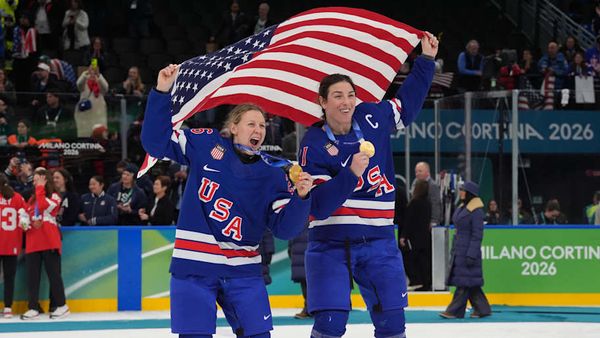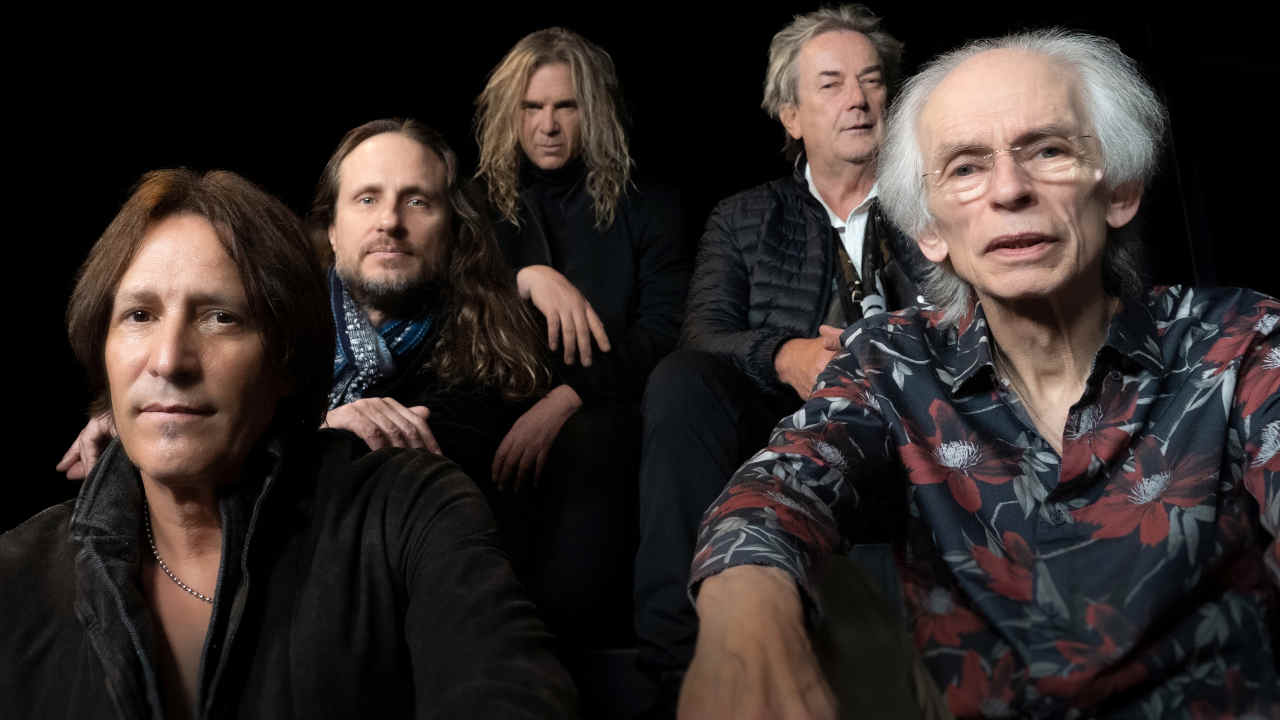
It was Jon Davison’s childhood friend Taylor Hawkins who helped him get the gig as vocalist with Yes in 2012. The late Foo Fighters drummer had the ear of the band’s bassist and founder member Chris Squire.
“Taylor had been talking me up for years,” says Davison. “He was so magnanimous. He kept telling Chris: ‘If you ever need a new vocalist, I know the guy.’ I think Chris acquiesced just to shut him up. Then of course we all met and played together, and Chris realised it was the right thing.”
Californian Davison had been fronting mid-tier proggers Glass Hammer, and with his good looks and high, clear tones highly reminiscent of Yes’s original vocalist Jon Anderson (who left in 2008) he was a shoo-in when previous incumbent, Benoît David, left after one album.
The 11 years since Davison joined Yes have been a turbulent time for the prog veterans. They’ve endured the losses of Squire in 2015 and longtime drummer Alan White last year. In 2016, former members Anderson, Rick Wakeman and Trevor Rabin launched a rival band, A.R.W., then later changed their name to Yes Featuring Jon Anderson, Rick Wakeman And Trevor Rabin. Even Yes’s induction into the Rock And Roll Hall Of Fame in 2017 was marked by low-level bickering and behind-the-scenes tension between the various factions.
But Yes are prog’s great survivors. There may be no original members left – guitarist Steve Howe, who joined in 1970, is the longest-tenured Yes-man, even if his timeline with the band is far from unbroken – but they’ve continued to release albums. The latest of these is Mirror To The Sky, their third album with Davison after 2014’s lacklustre Heaven & Earth and 2021’s The Quest, and easily the best of them. The Yes of 2023 might be unrecognisable compared to the Yes of the 70s or 80s, but their spirit remains as stubbornly unbreakable as it ever was.
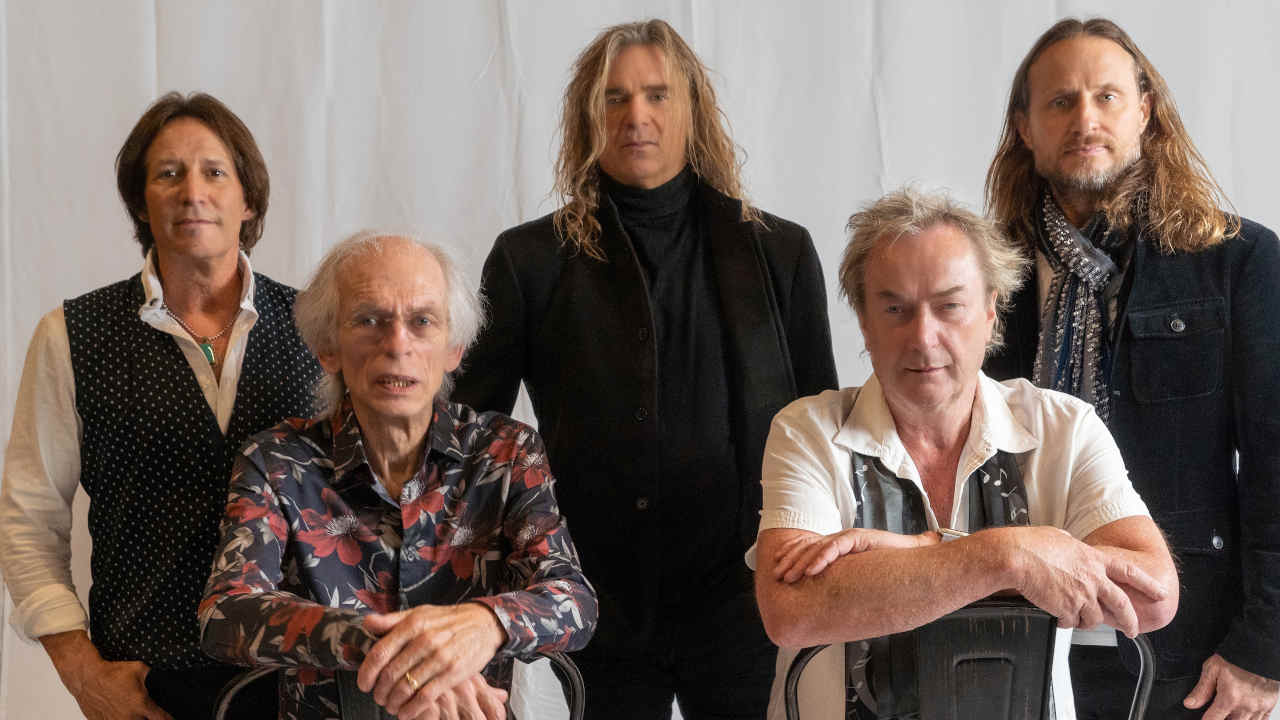
Last year the band emerged from covid stasis to play 45 shows in the UK, Japan and the US to mark the 50th anniversary of Close To The Edge. Had covid not happened, by now they would have toured 1974’s epic Relayer. And perhaps it’s in the airing of such core material that the real ‘Yes-ness’ resides, regardless of who’s in the band’s line-up.
With a history stretching back to 1968, Yes famously had enough revolving-door personnel changes, intra-group disagreements and dramatic wranglings to make Succession look like The Waltons. Their fans are loyal and discerning, and a vocal faction maintains that without Anderson out front, it’s not Yes.
“I didn’t assume any responsibility for that,” says Davison, smiling. “I mean, why would I? I’m just the guy they hired and I would be crazy not to take the gig. I know Jon realises that, so there’s no blame on me for any reason.”
If there was any impostor syndrome to begin with, Davison has developed a mental checklist to help him through: “This first thing is to render a faithful performance that is gospel-true to the original versions. That’s why audiences have come. It’s about the nostalgia. The second is to incorporate a lot of self-expression, the third is technical accuracy, and the fourth is just to have a blast performing the music I love. I go down that checklist before I go on stage, and sometimes in the studio. When the psychological doubts creep in occasionally, it’s important to give myself that boost.”
Squire died of leukaemia in 2015, aged 67. He was insistent that the band continue without him, and nominated his replacement, Billy Sherwood, who had played with and written for Yes in the early 90s. Then last May drummer Alan White succumbed to illness at 72. His successor is seasoned player Jay Schellen, who deputised for/co-drummed with White on tour from 2016 as White’s health deteriorated. Albuquerque-born Schellen’s CV includes Asia and Badfinger, and Mirror To The Sky is his first album as a fully fledged member.
Completing the latest iteration are keyboard player Geoff Downes, who first joined the group for their 1980 album Drama (a UK No.2), and, at the centre of things, the now longest-serving member, Steve Howe, who’s still pushing Yes into the future. “With obstacles and all sorts of major disasters along the way,” Howe adds wryly.
It’s always a little tentative talking to the somewhat inscrutable 76-year-old Howe. He can be warm, playful and honest one moment, steely and a little evasive the next. Given the band’s tricky politics, it’s probably from years of trying to avoid saying the wrong thing.
“Yes is almost like an experimental group,” he says. “If we keep trying to go forward, what are we going to meet? You never quite know. But we resolve to find a way – there is momentum. As a record, Heaven & Earth lost our momentum and credibility, until we did The Quest [2021]. We knew we’d had a sort of pit there, and it was a bit disappointing. But we weren’t so reliant on recordings at that time, because we were mainly a live act.”
Live performance remains Yes’s lifeblood. Howe’s recent band highlight was a run of shows in the US on last year’s tour.
“Florida is not my favourite state, but we hit some high spots there in the music,” he says, “particularly in venues where they didn’t sell alcohol. Some of them where they do it gets rowdy, people shouting out: ‘I love ya!’ and crap like that. You really don’t need that. Touring isn’t all about being happy and having a party. Yes moaned an awful lot in the seventies about management – moan, moan, moan – all the time. In fact a lot of it is beyond your control.”
Tellingly, Howe’s highlight wasn’t that 2017 Rock And Roll Hall Of Fame ceremony. He was honoured along with the other members from the band/bands circa Union, the turbulent 1991 album/tour mash-up of the two branches of Yes at the time: Squire, White and guitarist Trevor Rabin, and the ABWH offshoot with Anderson, Bill Bruford, Rick Wakeman and Howe. They were inducted by Rush’s Alex Lifeson and Geddy Lee. Lee played bass when they performed their classic Roundabout; Howe played on Owner Of A Lonely Heart, the huge hit single from the 1983 Rabin-powered, Howe-less commercial smash album 90125.
Howe gives a pantomime exclamatory “Whoo!” at the memory. “The further I go from it, the more speechless I get about those couple of days. There’s much I could tell you, but I’m not gonna. Basically, there was a hellish side to it. It was like skating on ice but you’ve never skated before. I don’t want to decry it, but there were problems. There was a bit of pushing and shoving going on. It was very unusual: the Union line-up had been selected, and it was fortunate that [original Yes keyboard player] Tony Kaye was on that tour. Some people got their due respect and others didn’t.”
Squire was inducted posthumously. Controversially original guitarist Peter Banks, who died in 2013, was not.
“I mean, I enjoyed it,” Howe adds. “Anything I do with Bill [Bruford] now is always great fun. I’m not really a big fan of fame and celebrity and all that. I’m quite happy to noodle away like Chet Atkins always did, avoiding the spotlight. Unfortunately I’ve got the spotlight quite a lot. That [induction ceremony] show had some highly commercial elements to it – the less said the better.”
The same year that Yes were inducted into the Hall Of Fame, Howe’s highly talented drummer/keyboard player son Virgil died suddenly of a heart attack, at the cruelly early age of 41.
“Steve had to go through the unthinkable,” says Davison. “To lose your son, someone should never have to go through that. So we backed off from our creative studio efforts within Yes for a time. We were giving Steve his proper period of healing.”
It’s notable how fond Davison is of Howe: “I’ve gotten to know him really well. We have this sort of effortless harmony. He has such a vitality, physically, mentally, and creatively. He’s so sharp and so driven. A lot of musicians as they get older slow down a bit, and he hasn’t. There’s no stopping Steve Howe, and it’s great to be in his presence. It’s very magnetic.”
On both The Quest and Mirror To The Sky, Davison has the lion’s share of the co-writing credits with Howe, with Sherwood and Downes also contributing. Songwriting in 21st-century Yes is a collaborative thing.
From its 14-minute title track to its sweetly infectious coda Magic Potion, Mirror To The Sky ticks so many Yes boxes. It’s grandiose, metaphysical, and adorned with superlative musicianship and melodies. There’s hippie sentiment (All Connected, Luminosity), but it isn’t above having a funny, acerbic piss-take of social influencers and all their vacuity (Living Out Their Dream). Circles In Time is a beautiful, deceptively complex acoustic piece from Davison, that really caught Howe’s ear.
Sherwood and Schellen sent their bass and drum parts in from an LA studio to that of trusted engineer Curtis Schwartz, in West Sussex. Here it all came together last year with Howe as producer – only the second time he’s taken on that mantle, after The Quest.
“It’s taken some refinement,” he says, “Sometimes I’ve had to say [to the band]: ‘No, not this time’, or ‘Let’s develop this more’, but their input is what inspires me to stick with it. Going into the studio for three months and driving each other mad trying to record like the old days used to be, that doesn’t work for anybody’s psyche any more. We’re all in tune with file sharing, and we’ve invented our own version of how to make it work efficiently. Curtis deserves a lot of credit for that.”
Howe contends that in the studio the current line-up “are not here to be a cover-band/mimic Yes; we don’t want to try to do another Heart Of The Sunrise. We love the music, but don’t want to replicate it in some way that would cheapen the idea. We’ve got the authority to go forwards with Yes. And I think that’s the real key.” That said, the latest intake are all acolytes of the band. The ‘Yes way’ has been in their bones since adolescence, as fans, so there’s a fortuitous feedback loop there.
“I was raised on Yes music,” says Davison. “I matured and developed as a musician and singer within ‘the School Of Yes’. The line between what is representative and what is personal is quite thin. But the lyrics and melodies I come up with are as genuine as possible and straight from my heart.”
If a Howe idea isn’t quite there yet, are the new guys able to say so?
“Oh yeah,” Davison insists. “That trust and respect is there. I think Steve is finding the current version of Yes to be the one he always wanted, the one he envisaged. So in his latter years, perhaps it’s the last chapter or the penultimate chapter. I think we all want to bring him that joy and satisfaction.”
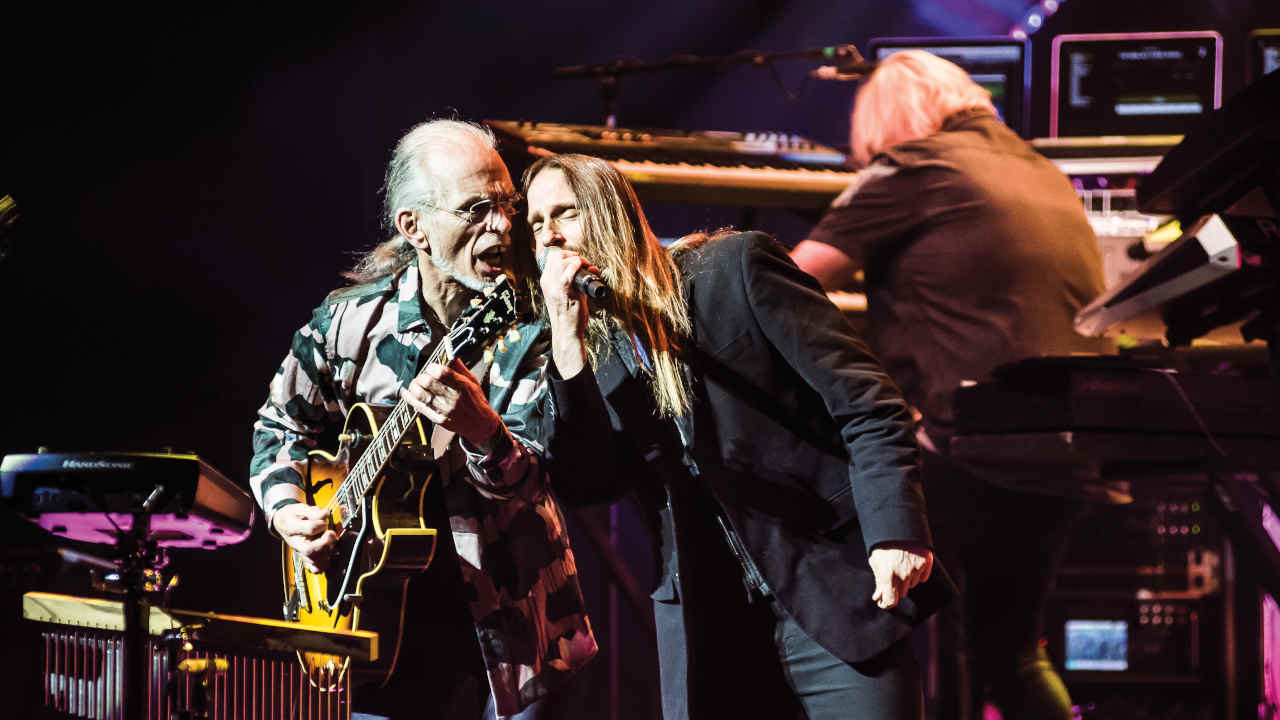
The spectre of finality hangs in the air. For now there’s Mirror To The Sky, and The Classic Tales Of Yes Tour announced for next year. Yes go on, without Jon Anderson, Chris Squire, Alan White. There will come a day when Howe too will step away from Yes, and there’s a sense that, as things stand, the band might continue without him.
“I would be silly not to think that was most probably going to happen,” Howe says. “There’s things that have the potential to grow and carry on through the hands of the younger generation. I think maybe I’d have the same spirit that Bill [Bruford] has always had – ‘The band can go on’. The only word of caution is I’d like it to be carried on in the spirit of a progressive rock band, because progressive rock is what this is.”
With Yes 2023 in good shape in the studio and on stage, Howe has no reason – a big payday aside – to reunite with other past members.
“It’s something I’m absolutely resistant to, because I remember the fiasco of the Union tour,” he says. “It was very, very difficult and out of control. Sometimes I might have thought: ‘Well, one day maybe’, and one never wants to say never, but basically I can’t see it.
“I love Jon [Anderson]. I’m a lot older now, and so is he, and the only terms I work on is that I’m happy working on this. I’m not going to take a sudden load on my back that I either don’t need or don’t want. My music’s always guided me, and it’s not telling me to do those things, it’s telling me to go forwards. If it keeps steering me where it is now, then it’s great to have this live and vibrant Yes. I wouldn’t want anything else.”
Mirror To The Sky is out now via InsideOut.
